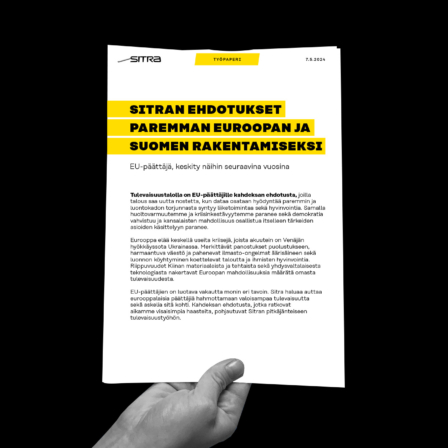The digital giant Apple has developed and patented technology that enables the measurement of biological signals, such as ear-electroencephalogram (EEG) via AirPods. The technical solution developed by Apple is an example of neurotechnologies that have evolved in recent years.
Information about an individual’s brain activity, nervous system reactions and biological signals can be collected with the help of technology, either inside the body or with external sensors. Neurodata is information that is classified as personal data, and it is not irrelevant how it is used.
The development of artificial intelligence is constantly bringing new technological opportunities to the market, making it easier to manipulate people. In 2023, UNESCO highlighted ethical issues related to neurotechnologies and artificial intelligence, such as preserving the privacy of ideas and individual freedom in situations in which a person does not consciously perceive that they have been manipulated or misled by technology. Situations can also become problematic situations when users are unaware of the implications of the information collected about them.
A report by the World Economic Forum (WEF) published in June 2024 rated neurotechnologies as one of the technologies that will significantly transform societies and economies in the coming years. In its 2024 list of a hundred growth companies with the highest societal change potential, the greatest growth potential was observed in sectors such as space, neurotechnology and clean technology.
Benefits of neurotechnologies in healthcare
According to an OECD (2024) review, neurotechnologies have been found to have benefits in the treatment of diseases. With the development of artificial intelligence, the possibilities of using neurotechnology are spreading beyond medical application.
For example, brain-computer interface technologies can be used to bring mobility to paralysed patients. In the United States, the neurotechnology company Synchron recently reported the first case of a person with the neurological disorder ALS benefiting from an implantable brain-connected hardware and Apple’s Vision Pro headset.
It was possible for the person with paralysed hands to wear Vision Pro glasses to guide their hands with eye tracking and thought control using technology implanted into one of the veins within the brain.
Use of neurotechnologies in marketing is a concern
Using artificial intelligence, data collected with the help of neurotechnology can be analysed to develop personalised marketing. As neurotechnologies become more common, the debate over the use of neurodata in marketing has escalated.
Neuromarketing utilises biological signals such as neurodata collected by an EEG to assess people’s reactions to the products or advertisements being marketed to them. For example, a person viewing ads on a social media platform may be targeted with more personalised ads based on what information their smartwatch has collected about their reactions to each ad.
Neurotechnologies can also be used to assess consumer behaviour and to try to influence people’s purchasing behaviour, for example.
EU seeks to protect its citizens through legislation
A large proportion of the companies and market specialising in neurotechnology is in the US, where the lack of regulation has raised concerns about privacy.
In Europe, the situation is different. With the General Data Protection Regulation (GDPR), online manipulation and user profiling (personalisation) based on personal data rose to public awareness.
The EU Artificial Intelligence Act goes even further. The AI Act, which entered into force at the beginning of August 2024, is close to the EU product safety regulation aiming to foster responsible AI development and deployment in the EU. The aim of the Artificial Intelligence Regulation is also to influence the largest technology giants and to regulate the areas in which artificial intelligence is used based on a risk-based approach. In other words, risks to health, safety or people’s fundamental rights are minimised by banning certain uses of artificial intelligence altogether or by setting conditions for the use of certain systems.
The Regulation prohibits certain AI systems, and the prohibited systems must be withdrawn from the EU market within six months of the entry into force of the Regulation.
Vulnerable people are protected
Prohibited AI systems also include systems that can be used to manipulate vulnerable people. These include talking toys that manipulate children with sound, image or video stimuli to act in ways in which they otherwise would not.
Manipulation may take place with the aid of neurotechnology, including in a brain-computer interface or in virtual reality when a person is wearing virtual glasses.
The prohibition is due to the fact that subliminal manipulation techniques using artificial intelligence (also called dark patterns) can be used to persuade people to engage in harmful behaviour or to distract them from making decisions in a way that destabilises and undermines their independence, decision-making and freedom of choice.
Columbia University Law Professor Anu Bradford (2023) has described the European approach to data economy regulation as human-centric, as it prioritises the rights of users of digital services. In the US, technology regulation is market-driven, and in China, it is government-driven. European legislation safeguards us from the manipulation linked to neurotechnologies.
The emergence of neurotechnology requires careful attention from legislators
The GDPR laid the foundation for the protection of personal data and privacy, and the Artificial Intelligence Act complements it.
So should we be concerned about neurotechnology-assisted marketing and privacy of thought in Europe? In principle, legislation protects us in Europe, but for AI systems, the entry into force of the regulation is only the beginning.
The success of regulation depends on the success of its implementation. At any rate, the development and use of neurotechnologies must be monitored, and hopefully EU legislation will ensure that we can control the digital giants that develop neurotechnologies.
The data strategy presented by the European Commission in February 2020 has guided the development of a data-driven economy, artificial intelligence and society in the EU. Once the new Commission has begun its work, we should discuss how the EU Data Strategy should be developed and continued in the coming period.
It is clear that member states must support the Commission in promoting the Data Strategy to drive high-quality innovation in Europe and strengthen the Union’s internal market. The implementation of the Data Strategy must be continued with determination.


